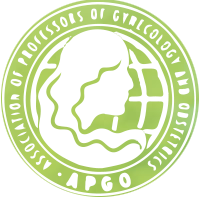UMEC Spotlight on Faculty Development: Sarah Shaffer, DO
Meet Sarah Shaffer, DO
Clinical Assistant Professor, Assistant Clerkship Director
University of Iowa
 At the 2018 Martin L. Stone, MD, Faculty Development Seminar, Doctor Shaffer (with Amy Thompson, MD, and Alice Chuang, MD, MEd) presented Revitalizing ‘PORE’ Assessment Practices: Valid and Reliable Assessment Tools in Medical Education.
At the 2018 Martin L. Stone, MD, Faculty Development Seminar, Doctor Shaffer (with Amy Thompson, MD, and Alice Chuang, MD, MEd) presented Revitalizing ‘PORE’ Assessment Practices: Valid and Reliable Assessment Tools in Medical Education.
APGO: What is your role in medical student education?
Doctor Shaffer: I am the assistant clerkship director for the 6-week ob-gyn clerkship at University of Iowa. Specifics of my role include managing the didactic lecture schedule for each 6-week block including providing lecturers assistance designing their lectures to be interactive and engaging for adult learners. Students desiring or needing study counseling or assistance – especially in the transition to the clinical environments and learning – can meet with me throughout the clerkship. I am also the faculty liaison for the medical school program designed to teach the breast and female pelvic examinations as well as the ob-gyn interest group.
APGO: What was the inspiration for your presentation topic?
Doctor Shaffer: Fueled by the example and encouragement of APGO friends and mentors, I am currently pursuing a Masters degree in Medical Education (MME). The challenges of my own journey as academic generalist with training in obstetrics and gynecology – but not in education – have led me to seek information and experience with teaching. One of the first things I have learned is the depth and breadth of all that is encompassed within teaching – needs assessment, instructional design, assessment, standard setting, evaluation, etc. The more I encountered, the more interested I was in all that I did not know about how to help others learn.
APGO: What were some of the challenges you faced while developing your program? What was the solution?
Doctor Shaffer: It is incredible to get to work with APGO members from all over the country with varying interests and backgrounds. However, distance and busy schedules can make it difficult to clarify roles and ideas or arrange content. Timing is also hard to plan at a distance when there is an abundance of applicable content. Finally, the lofty but necessary goal of interacting with the information is difficult to plan for a wide range of medical educators from across the country.
APGO: What resources did you find the most useful in developing your program (including APGO resources)?
Doctor Shaffer: I used several resources, including:

Books
- Assessment in Health Professions Education, by Downing & Yudkowski, Routledge
- Tools for Teaching – 2nd Edition, by Barbara Gross Davis, Wiley (an APGO Academic Scholars & Leaders resource)
- Curriculum Development for Medical Education – 3rd Edition, by Thomas & Kern & Huches & Chen, John Hopkins University Press
- Teaching and Learning Communication Skill in Medicine – 2nd Edition, by Kurtz & Silverman & Draper, Radcliffe
APGO Resources
- Teaching Tips (Assessing Medical Students, Evaluation, etc.)
- Medical Student Educational Objectives
As well as numerous articles assigned or discovered during learning and research for both the APGO ASL and my Master degree programs.
APGO: What are one to three things that you hope people who attended your presentation at the Faculty Development Seminar take home with them?
Doctor Shaffer: I hope attendees learned a few things, including:
- A more developed and robust concept of assessment in medical education
- More resources to assist in designing reliable and valid assessments (including APGO colleagues who are willing to help!)
- An interest to gain skill and experience with assessments to be used is medical education
The 2019 Martin L. Stone, MD, Faculty Development Seminar isJanuary 6-9 at the Hyatt Regency Maui in Lahaina, Hawaii. Abstract submissions are being accepted until May 14, 2018. Click here to learn more.


